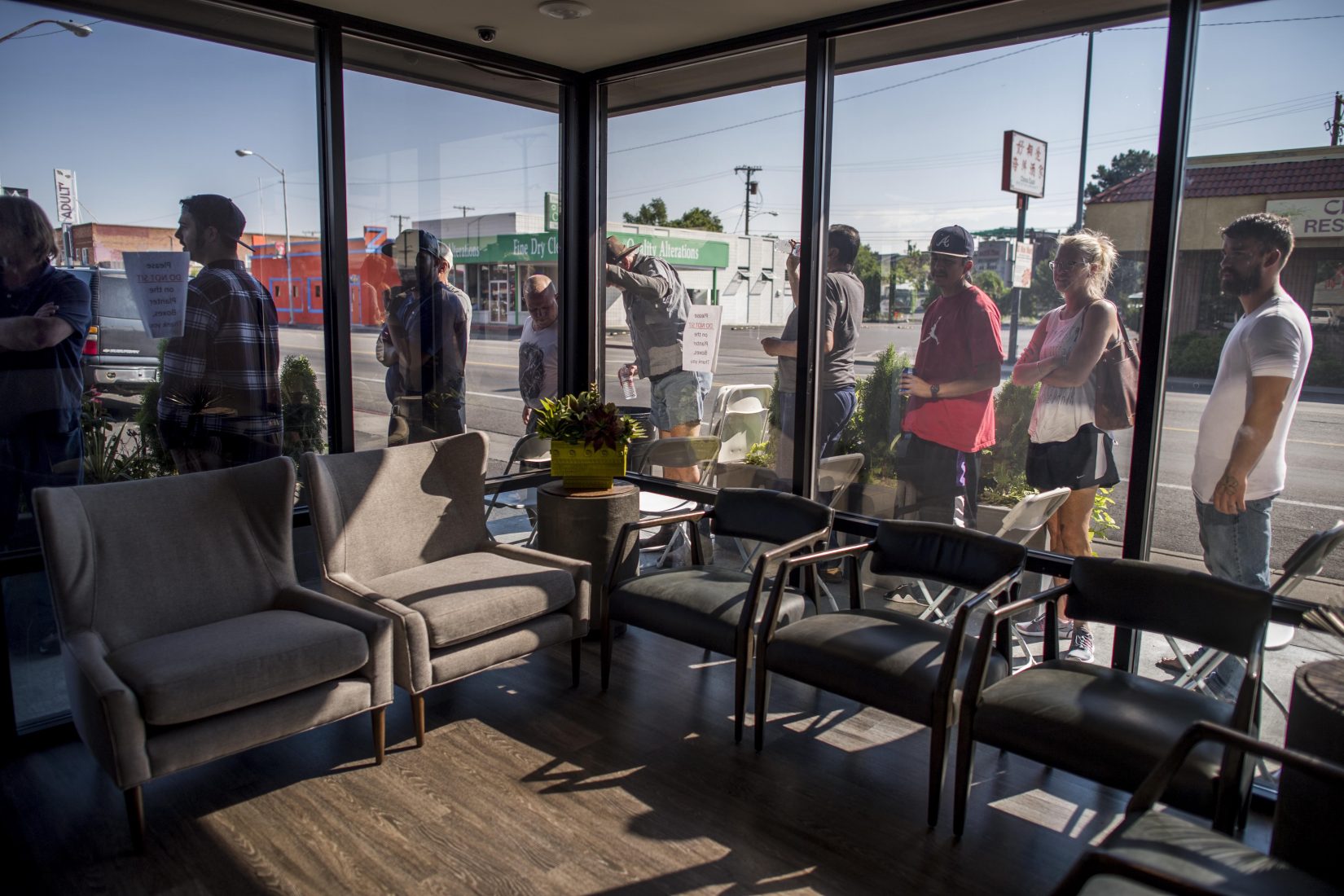RENO, Nevada – Nevada’s fast-developing experiment with legal sales of recreational marijuana was an instant hit, and the Fourth of July weekend gave the Silver State a taste of the green rush.
In the first few days of sales, dispensaries reported more than 40,000 recreational transactions, a push that created two situations here: A rudimentary distribution system meant there wasn’t enough marijuana to stock the shelves, and high demand confirmed state officials’ sense that weed sales could help bolster state coffers.
The lack of product was due to a distribution problem the state discovered at the last minute and didn’t solve before sales were allowed July 1. Although state revenue projections estimated that the burgeoning marijuana industry could provide an extra $100 million to the budget during the next two years, the state rushed to get it on sale without entirely figuring out how to get it to customers.
The new state marijuana law gave exclusive distribution rights to wholesale alcohol distributors for 18 months, but when the first sales were allowed July 1, none had met the requirements for a license. Dispensaries, which had been handling medical marijuana sales for two years, stocked up. Sales were far greater – in some cases several times greater – than anyone expected.

So, worried that potential tax revenue could be at risk, the Nevada Department of Taxation declared a state of emergency, proposing regulations that would enable the expansion of distribution beyond the liquor industry.
Deonne Contine, executive director of the Department of Taxation, got to the heart of the matter Thursday as officials considered emergency fixes: “Dispensaries will run out of product — they’re already running out of some products – and there will be a budget shortfall if that happens. Because if these businesses can’t sell products, then we can’t collect tax.”
On Thursday, the state Tax Commission unanimously approved the emergency regulations after several hours of public commentary. Two distributors won licenses this week, and Contine is determined to get more licenses awarded as soon as possible. “Obviously, as more licenses are awarded, more sales will occur and revenue will increase,” she said.
Looking to crack down on the black market and maximize tax revenue, the state moved to start sales of recreational marijuana just six months after voters approved a ballot initiative.
Whatever legislators in this Republican state thought of the idea before, now that recreational marijuana has been legalized in Nevada, they want to make sure the state is getting its cut. Gov. Brian Sandoval (R) has put a 15 percent excise tax on wholesalers and a 10 percent retail sales tax on recreational sales. About $70 million of the $100 million in marijuana tax revenue is expected to come from recreational sales and is earmarked to shore up the state’s funding for K-12 education, which is facing a $40 million shortfall.
The pot business here has been booming. Outside the Blüm dispensary in Reno, the store has had to add a row of about 20 folding chairs on the sidewalk, with a cooler of water because people have been waiting an hour or more in 100-degree weather.
“I was here the first night, and they stayed open all night because they didn’t want anyone who had been in line to not be served,” said David Flint, who has been back to the dispensary more than once because he likes its offerings’ variety. “It’s more expensive, but then you can get exactly what you want and you don’t have to deal with a street dealer.”
The crowd along Virginia Street, the city’s main drag, is varied. Young and old, clean-cut and scruffy, casual users and veterans. Some felt a little exposed waiting outside for something that wasn’t legal just days ago.
“I feel like a college student with a fake ID and like my parents are going to bust me any minute,” said one woman, who declined to give her last name because she teaches at a local university and is worried about what her students and employer might think.
Every 10 minutes or so a security guard comes out to get the next eight patrons. They show their identification at a glassed-in desk before gaining access to the interior wait room, which looks a bit like the lobby of a high-end medical office, earthy tones with chrome and white accessories. Inside, a dozen or so people wait to be called into the retail space — a long, backlit counter that resembles a jewelry display case, but for its variety of cannabis products. Budtenders, many of whom are recent hires to meet the demand, help customers pick out what they want, ring them up and send them on their way with large white child-safe pouches.
Though off to a fast start, the Nevada marijuana industry is, like all others across the country, viewed as illicit in Washington. Marijuana sales and possession still remain federal crimes, and Attorney General Jeff Sessions, who was in Las Vegas this past week, is an opponent of recreational use.
“He could shut us down at any time, and he’s very anti-weed,” said Mikel Alvarez, director of retail for Terra Tech, which operates the four Blüm dispensaries in Nevada.
Alcohol distributors have cited reservations over federal regulations as one reason they’re hesitant to make the investments required to get marijuana distribution licenses. Dispensaries in Nevada and elsewhere largely shy away from using the U.S. banking system because of fears of a federal crackdown that could affect their funds.
The regulatory fight – which alcohol distributors are committed to, having filed lawsuits against the state and alleging the emergency regulations are invalid – is just one example that opponents of the new law point to when arguing that Nevada was too quick to get into recreational marijuana.
“Nevada stands alone with this six-month rush,” said Jim Hartman, an attorney and president of Nevadans for Responsible Drug Policy. “Why? What is the hurry here?”
